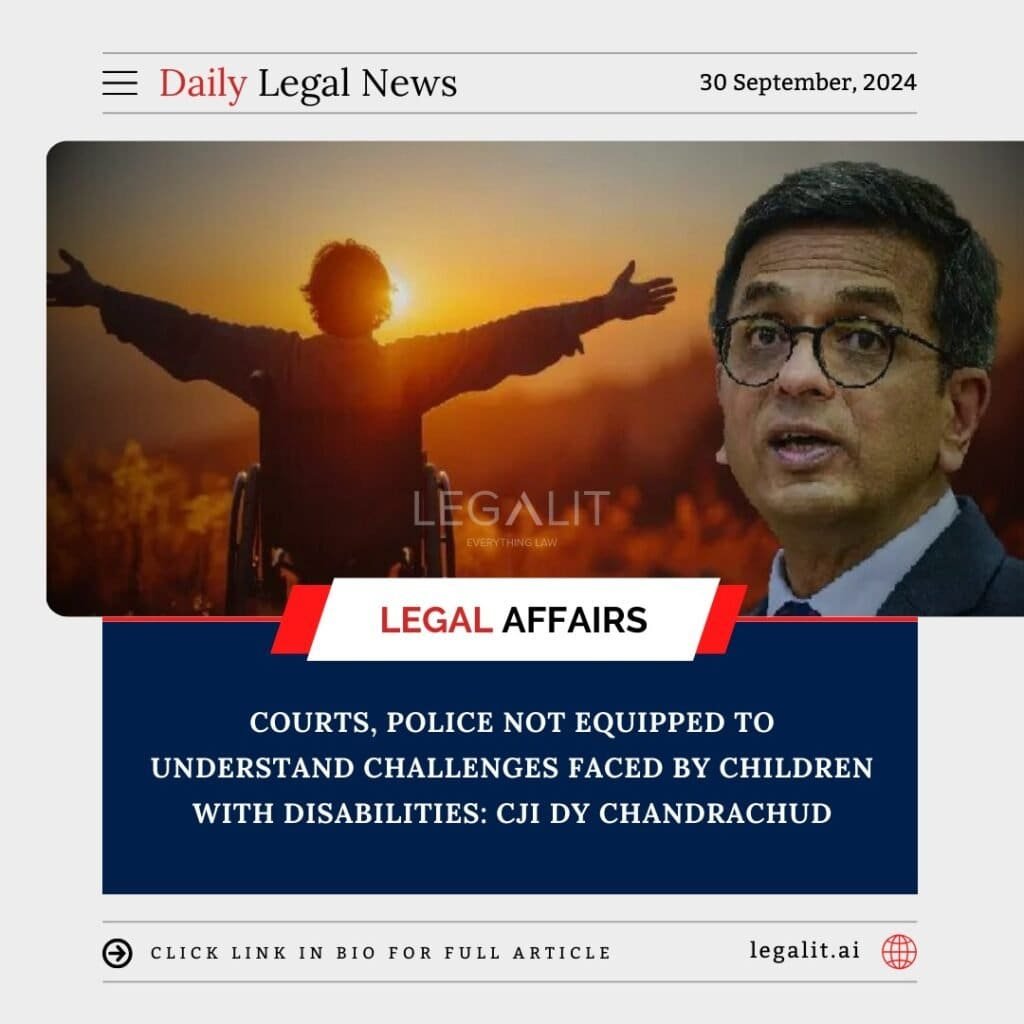
Chief Justice of India (CJI) DY Chandrachud has raised concerns about the lack of awareness and sensitivity among courts and law enforcement agencies when it comes to addressing the unique challenges faced by children with disabilities. Speaking at a recent event, the CJI emphasized the need for a more inclusive judicial and policing system that takes into account the rights and difficulties experienced by these children.
1. Gaps in Legal Understanding
CJI Chandrachud pointed out that both the judicial system and police force often fail to comprehend the complexities that arise when dealing with children with disabilities. These children, already vulnerable due to their conditions, face added hurdles in seeking justice and protection under the law.
- Lack of Training: Many police officers and judicial personnel are not trained to deal with cases involving children with disabilities. This lack of knowledge can lead to mishandling of cases, improper questioning, and even failure to identify when a child is in distress.
- Miscommunication: In many cases, children with disabilities, especially those with cognitive or communication impairments, find it difficult to articulate their experiences or even to understand legal proceedings. The system’s inability to adapt to these needs can result in children being misunderstood or ignored during the legal process.
2. Need for Sensitization and Reform
CJI Chandrachud highlighted the urgent need for reforms to make the legal system more accommodating for children with disabilities. This includes providing proper training for police officers, judges, and legal professionals to understand the specific needs of these children.
- Special Training Programs: The CJI proposed implementing training programs for police and judicial officers to help them better recognize and respond to the challenges faced by children with disabilities. These programs would focus on understanding different disabilities, communication methods, and how to conduct sensitive investigations.
- Legal Frameworks: The CJI also emphasized the importance of having a stronger legal framework that ensures the rights of children with disabilities are protected at every stage of legal proceedings. This includes developing guidelines for handling cases involving disabled children and ensuring they receive the necessary accommodations in court.
3. Inclusive Judicial Practices
CJI Chandrachud advocated for a judicial system that is more inclusive and accessible to children with disabilities. He pointed out that children with disabilities are often sidelined or overlooked in courtrooms, where their unique needs are not taken into account.
- Accessible Courtrooms: The CJI called for the creation of courtrooms that are physically accessible to children with mobility challenges, as well as providing interpreters or assistive technology for those with hearing or speech impairments.
- Child-Friendly Environments: To ensure children with disabilities feel comfortable and understood, the CJI suggested introducing child-friendly courtrooms and investigative environments that cater to their psychological and emotional needs.
4. Challenges in Law Enforcement
In his remarks, the CJI also focused on the police force’s approach to handling cases involving children with disabilities. He noted that the current law enforcement framework often fails to offer sufficient protection to these vulnerable children, sometimes exacerbating their trauma.
- Inadequate Investigations: Police officers may not recognize signs of abuse or neglect in children with disabilities due to their lack of training. This can lead to incomplete investigations or cases where perpetrators are not held accountable.
- Biases and Misconceptions: The CJI also pointed out that societal biases and misconceptions about disabilities can influence how law enforcement personnel treat children with disabilities, resulting in cases not being taken seriously or being dismissed without proper investigation.
5. International Best Practices
CJI Chandrachud urged the adoption of international best practices to improve how children with disabilities are treated within the judicial and law enforcement systems. He referred to models from countries that have successfully implemented inclusive practices to protect the rights of disabled individuals in legal settings.
- Use of Expert Testimony: Some countries employ experts in child psychology or disability studies to assist in court cases involving children with disabilities. These experts help ensure the child’s perspective is accurately represented, and their needs are met throughout the process.
- Assistive Technologies: The CJI highlighted the importance of using technology, such as speech-to-text devices or communication boards, to help children with disabilities engage in the legal process more effectively.
6. A Call for Compassionate Justice
CJI Chandrachud’s message was clear: the justice system must adopt a more compassionate and inclusive approach when dealing with children with disabilities. He stressed the importance of not just recognizing the legal rights of these children but also ensuring that they are treated with dignity and respect throughout their interaction with the judicial and law enforcement systems.
- Empathy and Sensitivity: The CJI called for an attitude shift, encouraging all those involved in the legal process to approach cases involving children with disabilities with empathy and a deeper understanding of their challenges.
- Institutional Change: Ultimately, CJI Chandrachud’s speech was a call to action for significant institutional changes within the judiciary and police force. He urged lawmakers, legal professionals, and law enforcement agencies to work together in creating a system that truly protects and supports the rights of children with disabilities.
Conclusion
CJI DY Chandrachud’s remarks shed light on the critical gaps in the Indian legal system when it comes to supporting children with disabilities. His call for reform and sensitization is a step toward ensuring that these vulnerable children are given a voice and fair treatment within the judicial process, with the hope of building a more inclusive and empathetic system for the future.